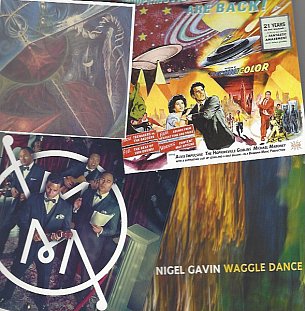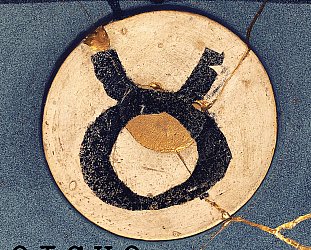Graham Reid | | 4 min read

Facing down an avalanche of releases, requests for coverage, the occasional demand that we be interested in their new album (sometimes with that absurd comment "but don't write about it if you don't like it") and so on, Elsewhere will every now and again do a quick sweep like this, in the same way it does IN BRIEFabout international releases and Yasmin Brown does for EPs.
Comments will be brief.
The Hopkinsville Goblins: The Hopkinsville Goblins Are Back! (Banzona)
Indeed they are. With an exclamation mark! Elsewhere said favourable things about their left-field and enjoyably oddball debut last year. Now their lo-fi meltdown of deliberately cheap pop and rock (mainstream well as alt, there are bits of early Elton John as much as the Modern Lovers) returns with social comment, raggedly likable vocals which sometimes go off-mic (“recorded under similar conditions of deprivation to the first one”), reference points in sci-fi, reductive New York pop-punk and so much more (or less, depending on how much you are prepared to forgive just to enjoy this).
Frankly, it is very hard to dislike if only for their song titles: Friday Night's Alright, Stucco Soul, , Even The Rats Have Pissed Off, Serf City (now that is clever!), Wool Blind and, perhaps best of all, There's Nothing New Under the Sun. With snippets from old B-grade movies interpolated and the sound collage of Amerikaemia (Diagnosis Dub) at the midpoint, this bridges pop, sociology, schlock and serious silliness. And silly seriousness.
I used to joke that some Flying Nun albums in the Eighties sounded like they were recorded for $18.50. This sounds like it came in under $12. But it was worth every dollar spent.
Recommended. Honestly . . . with an exclamation mark!
(Worth finding on CD rather than stream/download because they did spent time on the cover art . . . and any album which has Supercar on it gets my vote. A TV series far superior to Thunderbirds.)
Wool Blind, by Hopkinsville Goblins
Nigel Gavin: Waggle Dance (Thrum)
Any album with “music for the 7-string guitar” on the cover invites a Spinal Tap comment: “It's one more”. But Gavin's music has been so consistently impressive – and impressively diverse -- that you relegate frivolity immediately. You simply immerse yourself in his very considerable playing and compositional gifts which here allude to Indian microtones, Spanish styles, gentle ballads, deconstructed/reconstructed folk-cum-art music and many more hyphenated genres besides.
And sometimes they can all co-exist and morph with in the same piece, as on the eight minute opener Goldilocks which, after a delightfully understated melody about 90 seconds in turns on its heel into thick and savage chords before coiling back again. It is a cleverly circular piece which takes you a journey of unexpected twists, and sets you up for the enjoyable challenges to follow.
Elsewhere Gita is a chiming and thoughtful exploration of the interface between East and West; the title track is as witty and wiggly as its name suggests; A Benevolent Presence is wonderfully respectful ballad; Rose Hips nudges towards the funky . . .
Through his understated virtuosity, wide and deep musicality, and wit with wisdom, Nigel Gavin remains one of the most gifted guitarists in this country. So much so, it is a surprise he continues to live here when he is so much in demand elsewhere. And at Elsewhere.
Seven Aspects of Topaz, by Nigel Gavin
Modern Maori Quartet: That's Us (MM)
The obvious visual and MOR charms of this quartet have gone past Elsewhere (don't watch that kind of TV and seldom do YouTube) but we get the idea of them covering Royals, Pharrell's Happy and so on in an acoustic, close harmony style.
We don't quite get the Maori Showband connection which some have claimed (more the Howard Morrison Quartet, surely?) but their tele-visual appeal – yes, we checked for purposes of this review – is obvious. And this album is beautifully produced to showcase their soulful voices and seemingly effortless harmonies, and it comes with excellent musicianship. Among the players are guitarist Dixon Nacey who discreetly helps some songs like Outta Here get lift-off, keyboard player Andy Cochrane, Temuera Morrison as a guest vocalist. There is also a warm production by Dick Reade. It also – as did Sol E Mio – deliberately underplays their gifts in am aw-jeez-bro way (Punching, Haere Ra and most notably the crowd-pleasing Kai Song at the end), includes nods to familiar styles: soulful doo-wop on Don't Fall in Love and Upon A Star, late Fifties-cum-Seventies funk-pop on Blame You with Tem, the overly-earnest declaration of love on Come To Me.
This is a lovely, professional and polite album – Awhimai Fraser's vocals on Mareikura adds a yearning feminine voice – but at its centre it is quite a calculated album . . . but as such will please this very professional group's core audience.
Enormously talented vocal group who have hit the mood of the moment, and the warm-hearted standout Shine deserves to be a massive summertime hit.
Shine, by the Modern Maori Quartet
The Phil Corfield Band: Walking Through Worlds (bandcamp)
If the MMQtet above have all their dots connected and their “ducks on the same page” (as Pauly once memorably said in The Sopranos), this folk-rock band out of Dunedin come from the “we're doing it because we can” place. Songs like these are made because they wanted to and the internet outlets make it possible. Getting attention for it is another matter, which is why Elsewhere exists.
And we're going to say if Mike Nesmith's excellent National Band and solo career after the Monkees ever held any appeal (and it should have) then Walking Through the Woods is for you. Billed courageously as “a concept album” – a genre which as Elsewhere has noted had made a credible comeback in the past decade – it explores the idea of life and how to live it, memories and voices from the past (Somewhere Rings A Bell) and a retreat into dangerous seclusion (Black Dog Days, “we're all looking for someone to blame, makes us feel better that way . . . I level my gun like Stanley Graham”). But these songs – of the Man Alone/Smith's Dream/Speights ads lineage of closed-off New Zealand full of simmering but inarticulate anger – are couched within economic songs, which makes their impact even more focused and powerful.
The first two-thirds of this is an imagined film from our Cinema of Unease played out across nine songs between here and a strange historical escape to Australia. It seems to unwind when the obligatory reggae song beams in -- yes, sorta makes sense in this context -- but why do so many local artists feel they have to adopt the idiom, just the crowd pleaser? Corfield's conception hardly required it.
Otherwise this is impressive in its layers of music, literary thought and songcraft. Very impressive over the first seven of these nine songs, in fact.





post a comment